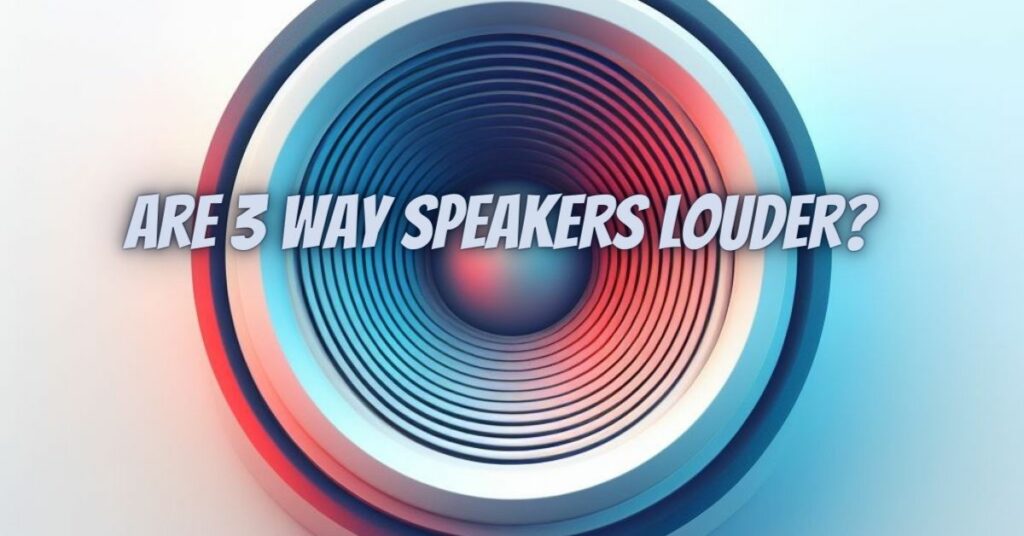When it comes to audio systems and speaker setups, the question of whether 3-way speakers are louder often arises. Understanding the factors that contribute to a speaker’s loudness is crucial for audiophiles, musicians, and anyone who seeks high-quality sound reproduction. In this article, we’ll explore the concept of 3-way speakers, delve into their design and functionality, and determine whether they are inherently louder compared to other speaker configurations.
Understanding Speaker Configurations
Before we can determine if 3-way speakers are louder, it’s essential to grasp the basics of speaker configurations. Speakers are typically classified into two primary categories: two-way and three-way systems.
- Two-Way Speakers:
- Two-way speakers, also known as 2-way speakers, consist of two primary components: a woofer and a tweeter.
- The woofer handles low-frequency sounds (bass), while the tweeter deals with high-frequency sounds (treble).
- Two-way speakers are widely used in various audio systems due to their simplicity and cost-effectiveness.
- Three-Way Speakers:
- Three-way speakers, also referred to as 3-way speakers, feature three main components: a woofer, a midrange driver, and a tweeter.
- The woofer still handles low-frequency sounds, the midrange driver covers the mid-frequency range, and the tweeter manages high-frequency sounds.
- Three-way speakers are designed to provide more comprehensive sound coverage across the entire audible frequency spectrum.
Factors Affecting Loudness
Loudness in speakers is determined by several factors, and the number of components (drivers) in a speaker system is just one of them. Here are some crucial factors that affect loudness:
- Driver Size:
- The size of the drivers (woofer, midrange, and tweeter) can significantly impact loudness. Larger drivers are generally capable of moving more air, which translates to greater volume and more substantial bass output.
- Power Handling:
- The power handling capacity of a speaker refers to its ability to handle electrical power without distortion or damage. Higher power handling often results in louder sound output.
- Sensitivity:
- Sensitivity is a measure of how efficiently a speaker converts electrical power into sound. Speakers with higher sensitivity ratings can produce louder sounds with less power input.
- Speaker Enclosure Design:
- The design of the speaker’s enclosure, such as ported or sealed, can affect its loudness and bass response. Ported enclosures often produce louder bass due to the resonance of the port.
Do 3-Way Speakers Tend to Be Louder?
While 3-way speakers offer distinct advantages in terms of audio fidelity and overall sound quality, they are not inherently louder than 2-way speakers. Loudness primarily depends on the factors mentioned above, including driver size, power handling, sensitivity, and enclosure design, rather than the number of drivers.
However, 3-way speakers have the potential to deliver more accurate and balanced sound across the frequency spectrum. The inclusion of a midrange driver allows for better reproduction of mid-frequency sounds, making them ideal for audiophiles who seek a more immersive listening experience.
In practical terms, if you compare a well-designed 3-way speaker system to a well-designed 2-way system with similar driver sizes, power handling, and sensitivity, you may find that the 3-way speaker produces clearer and more detailed sound. This enhanced clarity can give the impression of being “louder” because the sound is more articulate.
In summary, the loudness of a speaker system is influenced by multiple factors, including driver size, power handling, sensitivity, and enclosure design. While 3-way speakers are not inherently louder than 2-way speakers, they excel in providing a more comprehensive and accurate representation of the entire audible frequency spectrum. When considering speaker configurations, it’s essential to evaluate your specific audio needs and preferences to make an informed choice that suits your listening experience. Ultimately, the quest for superior sound quality and loudness should be guided by the overall design and components of the speaker system rather than the number of drivers it contains.


